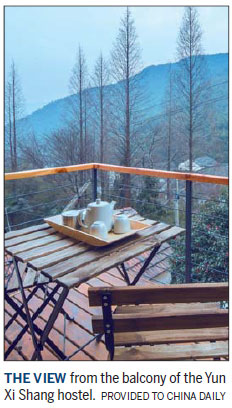Getting back to basics

In Chinese culture, intellectuals are supposed to dream of living like hermits in the countryside after they have attained a deep understanding of life and achieved success in their career or in academia. In the old days, many gave up living in the city and moved to villages to embrace nature.
This tradition has existed for thousands of years.
Now, Ji Xiaoxiang and Yang Mohan, both 33 and graduates of Tongji University's Urban Planning School in Shanghai, have made that journey to the village.
| The boutique hostel Da Le Zhi Ye, which is minimalist and comfortable, is located in Deqing county in Zhejiang province. |
After spending several years designing urban developments, they say they were left disenchanted, as many projects did not become a reality. Determined to find a new challenge, they traveled extensively in search of something that aligned with their skills.
They eventually ended up in Biwu, a village in Deqing county in the eastern province of Zhejiang.

"It was New Year's Day, 2013. It was snowing heavily the day we arrived in Biwu and the whole place was covered in soft, white snow," Ji recalls. "Yang and I were standing on the terrace of an old farmer's house, looking at the mountains, and it was there we decided this was the place."
The men rented the old house and spent their savings transforming it into a boutique hostel, Da Le Zhi Ye, the name of which comes from an ancient book, The Classic of Mountains and Rivers.
Ji had never lived in the countryside before but now prides himself on successfully integrating with the local community.
The hostel features huge windows, which let in copious amounts of natural light, and a small cafe that serves a decent Americano. Minimalist but comfortable, it also has a terrace where guests can relax and admire the starry skies.
There is a serenity that permeates the place that can't be found in a metropolis, and when night falls only the sounds of a nearby stream can be heard. "This is the way life should be," Ji says.
Yang and Ji are among a small group of urban elites who have done the opposite of young people from the villages, who still think the only measure of success is to own an apartment and have a decent job in cities like Shanghai and Beijing.
Ask any of the 274 million migrant workers in China about his or her reason for seeking work in the big cities and the most likely reason will be that farming, with its harsh conditions and meager income, is simply not worth it.
According to the National Bureau of Statistics, residents in urban areas earned 1.73 times more than their rural counterparts last year, down from 2.3 times in 2009. The income gap is the predominant factor that influences millions of farmers, especially young people, to abandon their hoes and head to greener pastures in the cities, with many of them ending up on construction sites and assembly lines.
In recent years, however, some people - mostly young and well-educated - have been going against the grain, heading from major cities to relatively remote regions, such as Deqing, to pursue their dreams.
"I hope to go even further," Ji says. "My plan is to be more involved in the local community of this beautiful place."
Remodeling old homes is merely the first step in his plan, he explains. He believes the slow village life can be made more colorful and energetic to attract a greater number of visitors from the city, which would in turn provide business for villagers.
"City dwellers can participate in fruit-picking or other simple farming chores, while outdoor lovers can go hiking. Local residents will end up with more job opportunities as a result."
Statistics from the Deqing government show the county has generated thousands of job opportunities in the transportation and retail sectors since it opened to tourism about eight years ago.
Yu Wei, a Shanghai interior designer, and his wife decided to build their dream home in Deqing's Moganshan Mountains. They have since converted part of it into a boutique hostel.
The 36-year-old says he enjoys village life. "The people here aren't as sophisticated, and I like the simplicity. However, this sometimes causes problems, like people not respecting contractual agreements," he says.
Wang Zehao quit his job as a software engineer in Ningbo on the east coast and returned to his hometown in Deqing about four years ago. He can testify to just how quickly the village landscape is changing.
"Much has changed since 2010. Many investors have come to build organic farms, while architects and interior designers are flocking here to renovate houses. Villages here now offer many jobs," says the 30-year-old, who now works as a butler. "Here in Deqing, I can live with my family and I'm actually earning more than I did in the city."
He says he aims to do more to promote his hometown to outsiders. "My boss and I plan to build a brand to sell agricultural products such as eggs, chickens and bamboo shoots," he adds. "I think people from the big cities will like our local flavor."
xuxiaomin@chinadaily.com.cn

(China Daily European Weekly 04/29/2016 page1)
Today's Top News
- Takaichi must stop rubbing salt in wounds, retract Taiwan remarks
- Millions vie for civil service jobs
- Chinese landmark trade corridor handles over 5m TEUs
- China holds first national civil service exam since raising eligibility age cap
- Xi's article on CPC self-reform to be published
- Xi stresses improving long-term mechanisms for cyberspace governance































